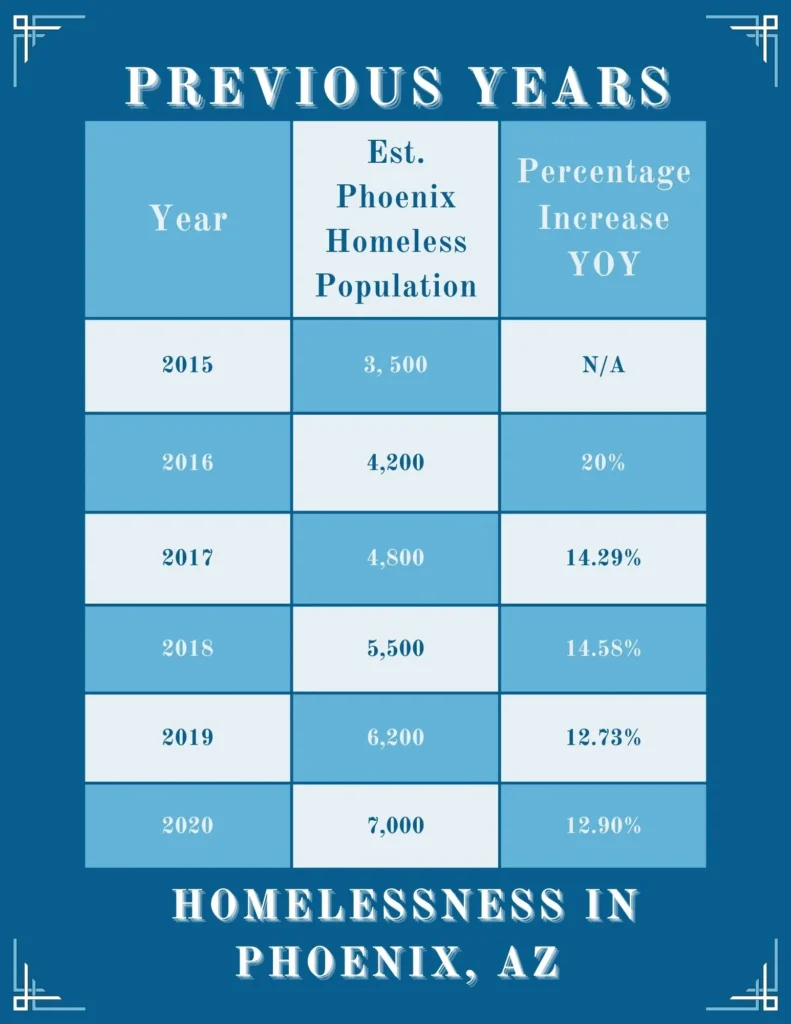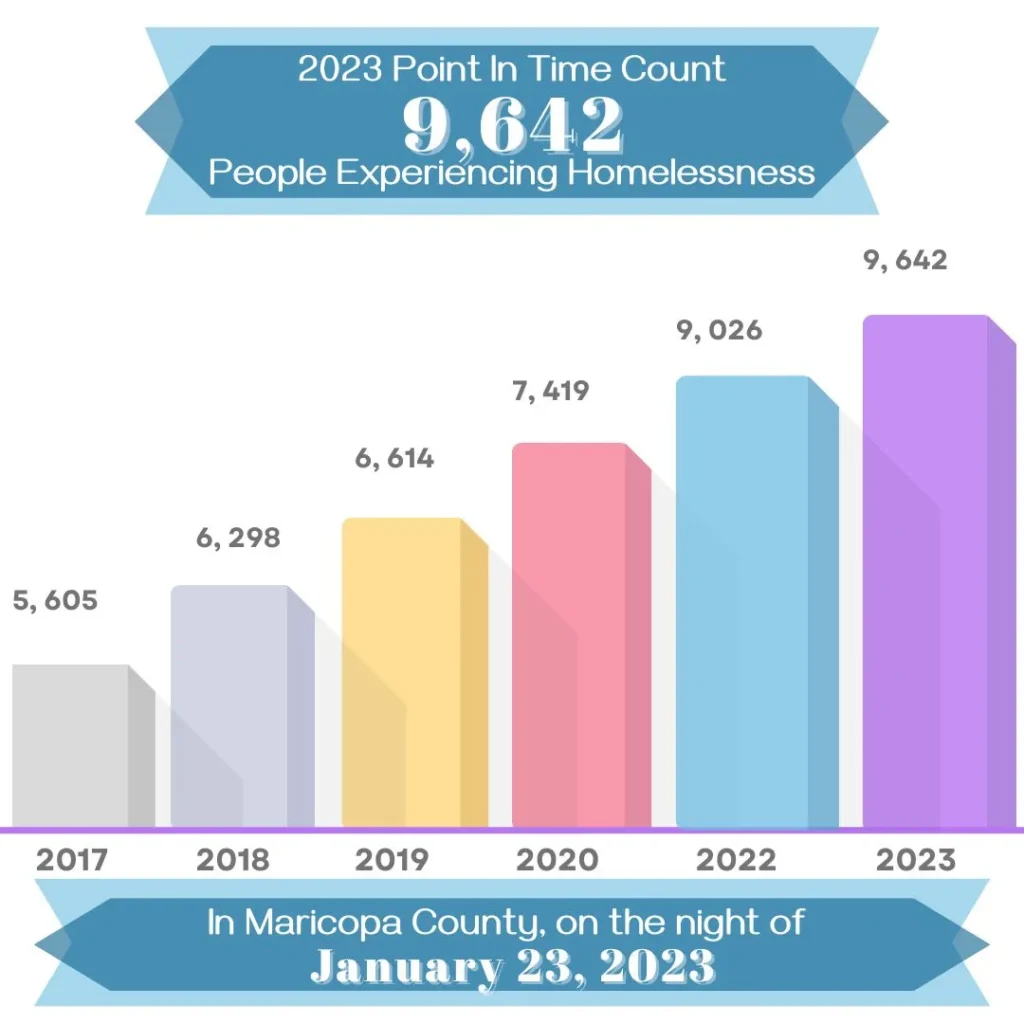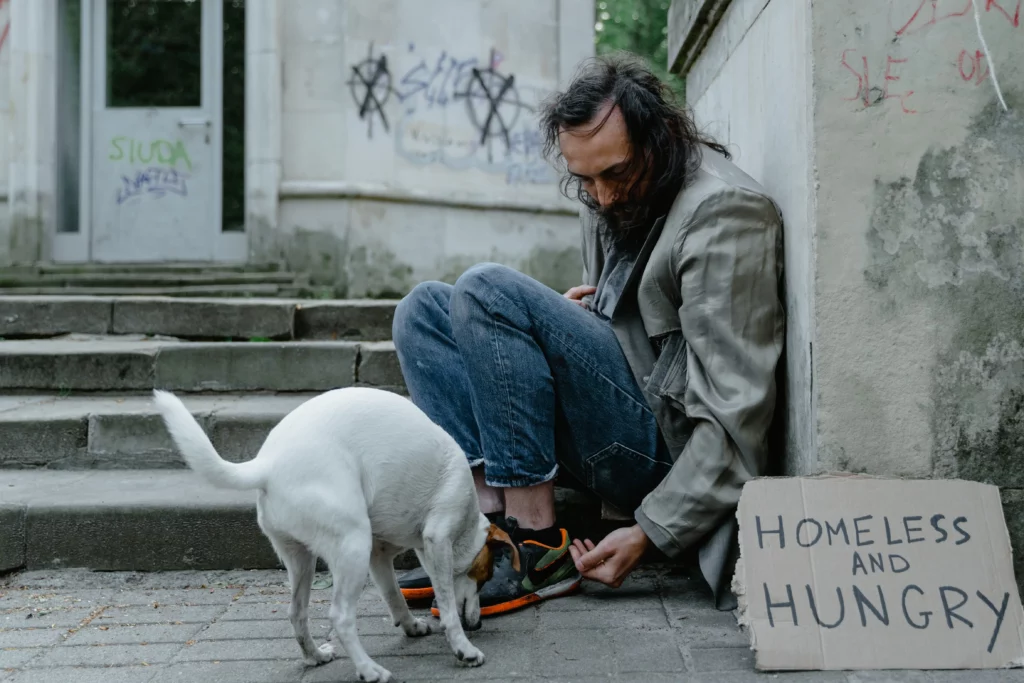Phoenix, Arizona, like many cities across the United States, is grappling with the serious and growing issue of homelessness. The rise in homelessness and substance abuse in Phoenix has become increasingly visible, with even a short five-minute drive through most areas of the city revealing the extent of the problem. In recent years, the city’s homeless population has grown significantly, highlighting the need for urgent attention and action.
To effectively address this crisis, it is essential to explore the critical link between substance abuse and homelessness in Phoenix. Addiction can exacerbate the already challenging situation for those lacking stable housing, creating a complex relationship between these two issues. By understanding the intricacies of this relationship, we can develop effective solutions and extend compassionate support to assist those in need on their journey toward recovery and attaining permanent housing.

The Rise of Homelessness in Phoenix, Arizona

The issue of homelessness in Phoenix has become increasingly pressing in recent years, with the city experiencing a significant surge in the number of individuals struggling with housing instability. The annual point-in-time count, conducted on January 23, revealed that 9,642 individuals were experiencing homelessness in Maricopa County, indicating a concerning increase compared to the previous year.
Staggering Numbers and Daily Struggles
A Growing Crisis
Data compiled by the U.S. Department of Housing and Urban Development further highlights the severity of the issue, revealing that the homeless population in the Phoenix metro area has grown by a disturbing 21% since 2020. This rapid increase in homelessness demands immediate attention and comprehensive solutions to address the needs of those experiencing housing instability.
The Tragic Toll
The Maricopa County Medical Examiner’s Office has reported a troubling trend, with homeless deaths doubling between 2019 and 2020, reaching nearly 600 fatalities. This tragic toll underscores the urgent need for support, resources, and interventions to protect the lives and well-being of those experiencing homelessness in Phoenix.
These alarming statistics paint a bleak picture of the rising homelessness crisis in Phoenix, emphasizing the critical importance of developing and implementing comprehensive solutions to support those affected. By addressing the root causes of homelessness and providing compassionate assistance, we can work towards creating a more stable and inclusive community for all.
Phoenix offers a range of resources for individuals facing the dual challenges of substance abuse and homelessness. Organizations like Cornerstone Healing Center in Scottsdale, AZ, provide evidence-based addiction treatment programs that address the root causes of substance abuse. Shelters, outreach programs, and community initiatives offer support services, including temporary housing, mental health counseling, and job training. These resources aim to help individuals achieve stability, recovery, and self-sufficiency. It is essential to reach out and connect with these support networks to access the assistance needed to break free from the cycle of addiction and homelessness.
Factors Contributing to the Increase of Homelessness in Phoenix, AZ
Economic Factors
Mental Health and Addiction
Mental health challenges and substance abuse are closely intertwined with the issue of homelessness in Phoenix. Individuals struggling with mental health conditions such as depression, anxiety, or schizophrenia often face significant barriers to maintaining stable housing and support systems. Limited access to mental health resources and treatment options can exacerbate these challenges, leaving individuals more vulnerable to homelessness.
Addiction is another significant contributing factor to homelessness in Phoenix. Substance abuse can lead to job loss, damaged relationships, and disconnection from support networks, creating a downward spiral that makes it increasingly difficult for individuals to maintain stable housing. The cycle of addiction can further isolate people, making it challenging for them to seek help or access the resources they need to achieve stability and recovery.
To effectively address homelessness in Phoenix, it is essential to prioritize comprehensive mental health and addiction treatment services. By providing accessible and evidence-based interventions, we can support individuals in their journey toward improved mental well-being and substance abuse recovery, ultimately increasing their chances of securing and maintaining stable housing.3
Limited Access to Social Services
Limited access to social services is a significant barrier for individuals experiencing homelessness in Phoenix. Homeless individuals often face challenges in accessing essential healthcare, mental health counseling, and other vital support services. Without adequate medical care and assistance, they may experience worsening health issues, leading to further instability and difficulties in their lives.
Insufficient outreach programs designed to connect with and assist the homeless population can also contribute to the problem. When individuals are not aware of or able to access available resources, they remain disconnected from the support they need to transition out of homelessness. This lack of connection can perpetuate the cycle of homelessness, making it even more challenging for individuals to find a path toward stability.
A comprehensive approach is necessary to combat homelessness in Phoenix effectively. This approach should focus on enhancing access to social services and strengthening outreach programs. We can create a more supportive environment that promotes stability and well-being by ensuring that homeless individuals have access to healthcare, mental health support, and other essential services. By actively engaging with the homeless population through outreach efforts, we can better identify their needs and connect them with the resources they require to break the cycle of homelessness and rebuild their lives.
💡
The Harsh Reality: Phoenix's Growing Homeless Population
Phoenix has been grappling with a significant rise in homelessness in recent years. The city’s homeless population has increased dramatically, with thousands of individuals, including men, women, and children, struggling to find stable housing on any given day. Factors such as job loss, economic instability, mental health challenges, and substance abuse have contributed to this growing crisis. The streets of Phoenix bear witness to the harsh realities faced by those experiencing homelessness, with tent encampments and makeshift shelters becoming increasingly visible throughout the city. As the community comes together to address this pressing issue, there is hope that through collaborative efforts, innovative solutions, and compassionate support, Phoenix can work towards reducing homelessness and providing stability for those in need.
The Intertwined Challenges
Substance Abuse and the Homeless Experience in Phoenix
Substance abuse poses significant challenges for homeless individuals in Phoenix, exacerbating their already difficult circumstances. Those grappling with addiction while experiencing homelessness face numerous obstacles that hinder their efforts to achieve stability and recovery.
The Toll on Physical and Mental Health
The impact of addiction on physical and mental health is particularly severe for those living on the streets. Without proper access to nutrition, healthcare, and sanitation facilities, individuals struggling with substance abuse often experience a rapid decline in their overall well-being. The combination of mental health issues and addiction further complicates matters, leading to feelings of isolation and hopelessness.
Barriers to Accessing Support Services
Substance abuse often prevents individuals from accessing the very support services and resources that could help them break free from the cycle of homelessness. The immediate need to prioritize survival and address addiction-related challenges leaves little room for focusing on the underlying issues that contribute to their housing instability. Without adequate support and resources, overcoming addiction becomes an even more daunting challenge, further trapping individuals into the cycle of homelessness.
To effectively address the complex interplay between substance abuse and homelessness in Phoenix, comprehensive and targeted interventions are necessary. These interventions must address both the addiction and housing needs of individuals, providing them with the tools and support they need to achieve lasting recovery and stability.
Demographics and Trends
Get Help for Substance Abuse at Cornerstone
Our compassionate, individualized approach addresses the root causes of addiction, empowering clients to achieve lasting recovery and build stable, self-sufficient lives.
Combating the rising homelessness rate in Phoenix, particularly among those grappling with substance abuse, requires a collaborative effort from the entire community. Some ways individuals can help:
- Volunteer or donate to local organizations that provide support services to the homeless and those in recovery.
- Advocate for policies and initiatives prioritizing affordable housing, mental health services, and addiction treatment programs.
- Educate yourself and others about the complex issues surrounding homelessness and substance abuse to combat stigma and promote understanding.
- Support local businesses and initiatives that provide job opportunities and training for individuals transitioning out of homelessness.
- Show compassion and empathy towards those affected by homelessness and addiction, recognizing their humanity and the challenges they face.
By working together as a community, we can create a more supportive and inclusive environment that fosters hope, healing, and the opportunity for a better future for all.
Challenges in Breaking Free from the Cycle of Addiction and Homelessness
Breaking free from the cycle of addiction and homelessness is a formidable challenge that requires a multifaceted approach. Substance abuse and homelessness often work in tandem, creating a self-perpetuating cycle that is difficult to escape. Homelessness can exacerbate addiction, as individuals may turn to substance abuse as a means of coping with the harsh realities of their living conditions. Conversely, addiction can worsen homelessness by depleting financial resources, eroding social support networks, and making it harder to secure and maintain stable housing.
To effectively break this cycle, interventions must simultaneously address both the substance abuse and housing needs of individuals. This requires providing access to comprehensive addiction treatment programs, mental health services, affordable housing options, and employment opportunities. By recognizing the interconnected nature of addiction and homelessness, communities can develop strategies that empower individuals to rebuild their lives and achieve long-term recovery.
Creating a supportive, compassionate, and hopeful environment is essential for those working to break free from the cycle of addiction and homelessness. By taking a multidimensional approach that addresses the unique challenges faced by individuals struggling with these issues, we can foster a community that promotes healing, stability, and lasting change.
Recommendations for Reducing Homelessness in Phoenix
To effectively combat homelessness in Phoenix, a comprehensive approach that addresses both the immediate needs of the homeless community and the root causes that lead to homelessness is necessary.
Increasing Affordable Housing Options
Increasing the availability of affordable housing is a crucial step toward reducing homelessness. This can be achieved through partnerships with developers to build more low-income housing units, providing rent subsidies for vulnerable populations, and encouraging landlords to participate in affordable housing programs. Additionally, exploring innovative housing models such as tiny homes and transitional housing can offer temporary solutions for those experiencing homelessness.
Expanding Access to Mental Health and Addiction Services
It is common for homeless individuals to face challenges with mental health and substance abuse, which can make it difficult to find stable housing. To tackle this issue, improving access to mental health and addiction treatment services is crucial. This can be done by increasing access to counseling, therapy programs, and specialized outreach teams, as well as ensuring that homeless individuals have access to high-quality healthcare and addiction treatment facilities.
Strengthening Support Systems and Social Services
A strong support system is essential to help homeless individuals reintegrate into society. Implementing case management programs that provide personalized assistance and guidance can help individuals navigate the complexities of accessing resources. Additionally, expanding social services like food assistance, hygiene facilities, and access to necessities can address immediate needs and offer a safety net for vulnerable populations.
Enhancing Job Training and Employment Opportunities
Having sustainable employment is essential in breaking the cycle of homelessness. Investing in job training and employment programs that equip homeless individuals with skills and job readiness increases their chances of obtaining stable employment. Working with local businesses to create employment opportunities and providing incentives to hire individuals transitioning out of homelessness can also help support their journey toward self-sufficiency.
Acknowledging that solving homelessness necessitates a joint effort among government agencies, non-profit organizations, the private sector, and the community is crucial. By collaborating and implementing these suggestions, Phoenix can take substantial steps toward decreasing homelessness and aiding vulnerable populations in achieving stability and self-reliance.
Combating Stigma and Misconceptions
Combating the stigma and misconceptions surrounding substance abuse and homelessness is essential for creating a more supportive and compassionate community. Unfortunately, destigmatizing these issues can be challenging, as societal attitudes often perpetuate negative stereotypes, further marginalizing those affected. The stigma associated with substance abuse and homelessness can discourage individuals from seeking help due to fear of judgment and rejection, making it difficult for them to access vital support services and treatment programs, perpetuating a cycle of isolation and vulnerability.
To address this, educating the public about the complexities of these issues is essential. Raising awareness about the root causes of homelessness, the impact of mental health challenges, and the systemic barriers that contribute to substance abuse can help foster empathy and understanding. By promoting open dialogue and encouraging a non-judgmental approach, we can work together to break down stigma and create an environment where homeless individuals with substance abuse issues feel empowered to seek help and access the resources they need to rebuild their lives.
Factors Contributing to Homelessness in Phoenix
These makeshift tents and temporary shelter communities have become an increasingly common sight in Phoenix as a stark reminder of the city’s growing homeless population. Tent encampments often lack basic amenities and sanitation facilities, exposing individuals to health risks and harsh living conditions.
The loss of employment significantly contributes to homelessness in Phoenix. When individuals lose their jobs, they may struggle to make ends meet, pay rent, and maintain stable housing, putting them at risk of becoming homeless.
Mental health challenges can make it difficult for individuals to maintain stable housing and access necessary support services. Homelessness can also exacerbate preexisting mental health conditions, creating a vicious cycle that makes it challenging for individuals to break free from the streets.
Hope for a Better Tomorrow
Despite Phoenix’s rising homelessness rate, there is hope for a better future. Numerous organizations and community initiatives are dedicated to providing assistance and resources to those in need, offering a glimmer of light in the darkness.
These support networks come in various forms, each vital in helping individuals achieve stability and rebuild their lives. Shelters provide a haven for those without a roof over their heads, offering a temporary respite from the harsh realities of life on the streets. Outreach programs connect with homeless individuals, assessing their needs and guiding them toward available resources and services.
Job training initiatives equip individuals with the skills and knowledge necessary to secure stable employment, empowering them to break free from the cycle of homelessness and achieve self-sufficiency. Addiction treatment centers, like Cornerstone Healing Center in Scottsdale, AZ, provide evidence-based practices that address the root causes of addiction, facilitating sustainable, long-term recovery. Mental health services offer support and therapy to those grappling with the emotional and psychological challenges that often accompany homelessness and substance abuse.
By working together with empathy, compassion, and a spirit of cooperation, we can create a future where everyone can access a safe and comfortable home. Through the collective efforts of the community, government agencies, non-profit organizations, and concerned individuals, we can make a meaningful difference in the lives of those affected by homelessness and addiction.
If you or someone you love is facing the challenges of addiction or homelessness, know that you are not alone. Help is available, and there is always hope for a brighter tomorrow. Cornerstone Healing Center in Scottsdale, AZ, stands ready to provide the support, guidance, and evidence-based treatment necessary to overcome these obstacles and embark on a journey toward lasting recovery and stability.
Together, we can build a community that fosters hope and healing and promises a better future for all. By extending a helping hand, a listening ear, and a compassionate heart, we can light the way toward a tomorrow filled with possibility, resilience, and the triumph of the human spirit over adversity.
Key takeaways 📝
- The Complex Relationship Between Substance Abuse and Homelessness
- Substance abuse and homelessness are intricately linked, with addiction often exacerbating the challenges faced by those experiencing homelessness.
- Addressing both issues simultaneously is crucial for helping individuals break free from the cycle of addiction and achieve stable housing.
- The Importance of Comprehensive Support Services
- Providing access to affordable housing, mental health support, addiction treatment, and job training is essential for reducing homelessness in Phoenix.
- A collaborative effort among government agencies, non-profit organizations, the private sector, and the community is necessary to implement effective solutions.
- The Power of Compassion and Destigmatization
- Combating the stigma surrounding substance abuse and homelessness is crucial for creating a supportive environment that encourages individuals to seek help.
- Promoting education, empathy, and understanding can help break down barriers and foster a community that prioritizes the well-being of all its members, including those struggling with addiction and homelessness.










